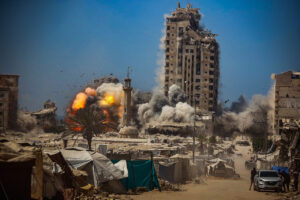The destruction of Gaza City is a crime against history

Smoke rises from the Mushtaha Tower, west of Gaza City, after it was hit by an Israeli airstrike, 5 September 2025
Baker Zoubi writes in +972 on 30 September 2025:
Palestinians in Gaza City are facing an impossible choice, as the Israeli army works to annihilate what remains of northern Gaza’s last bastion from the air and the ground. Hundreds of thousands of residents have already fled in recent days amid the intensification of Israel’s assault, forced to pay up to $5,000 to relocate in the knowledge that they will likely never see their homes again. Others are staying put, unable or unwilling to flee to areas that they know will provide no safety or dignity, preferring to die at home than in an overcrowded tent encampment in the south.
As residents scramble to escape death, there is little capacity to mourn the destruction of their city. But the Israeli army’s systematic erasure of Gaza City — flattening one neighborhood after another, as it did already in Rafah, Jabalia, Beit Hanoun, Beit Lahiya, and much of Khan Younis — is wiping out thousands of years of Palestinian and Arab heritage, representing a crime against history itself.
Many of the Gaza Strip’s multi-civilizational treasures have already been obliterated over the course of Israel’s two-year genocide. But Gaza City’s ancient origins, along with its centrality in the formation of Palestinian national identity and resistance against the Israeli occupation, make its ruination more than simply a human tragedy.
The city’s history dates back many thousands of years, and it is referenced in the Book of Genesis as having been inhabited by Canaanites. Its strategic location between Africa and Asia has made it a vital port and a target of conquest for the Assyrians, Babylonians, Greeks, Persians, Hasmoneans, Romans, and Ottomans.
As the Palestinian historian and former mayor of East Jerusalem, Aref Al-Aref, wrote in his 1943 book “History of Gaza,” Gaza City was “not built in a certain century, nor is it a result of a certain period, but rather of all the generations that have passed, from the day when the first pages of history were written to the present day.”
